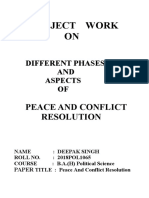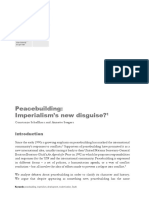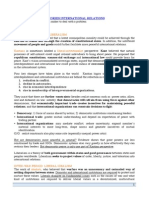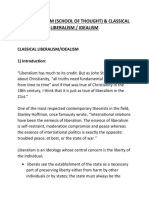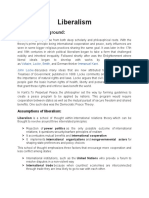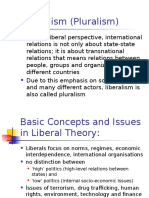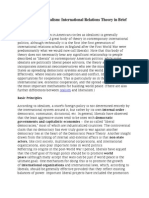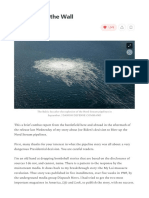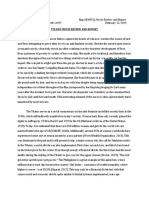Liberalism
Liberalism
Uploaded by
Haseeb AkbarCopyright:
Available Formats
Liberalism
Liberalism
Uploaded by
Haseeb AkbarOriginal Description:
Original Title
Copyright
Available Formats
Share this document
Did you find this document useful?
Is this content inappropriate?
Copyright:
Available Formats
Liberalism
Liberalism
Uploaded by
Haseeb AkbarCopyright:
Available Formats
3.
Liberalism
Shaping western political thought.
Or due to rapid industrialization
Took shape after world war 1
Theorizing which dates back, via Kant’s belief in the possibility of ‘universal and perpetual peace’, to the Middle
Ages and the ideas of early ‘just war’ thinkers such as Thomas Aquinas.
1970s onwards, often in the form of so-called neoliberalism.
new wave of democratization in the 1990s each gave liberal theory additional impetus.
notion of harmony or balance amongst competing interests
balance of interests tends to develop amongst the states of the world, disposing liberals to believe in the
possibility of peace and cooperation.
both liberals and realists accept that world affairs are shaped, in significant ways, by competition amongst
states, implying that the international system is, and perhaps must always remain, decentralized.
The difference, nevertheless, is that liberals assume that competition within this system is conducted within a
larger framework of harmony.
The key themes within liberal theory are as follows:
A. Interdependence liberalism
ideas about trade and economic relations
commercial liberalism (emphasizes the economic and international benefits of free trade,
leading to mutual benefit and general prosperity as well)
classical economics of David Ricardo (1770–1823) and the ideas of the so-called ‘Manchester
liberals’, Richard Cobden (1804–65) and John Bright (1811–89).
Free trade.
it allows each country to specialize in the production of the goods and services that it is best
suited to produce, the ones in which they have a ‘comparative advantage’
Cobden and Bright argued that free trade would draw people of different races, creeds and
languages together in what Cobden described as ‘the bonds of eternal peace’. Not only would
free trade maintain peace for negative reasons (the fear of being deprived of vital goods), but it
would also have positive benefits in ensuring that different peoples are united by shared values
and a common commercial culture, and so would have a better understanding of one another.
In short, aggression and expansionism are best deterred by the ‘spirit of commerce’.
Keohane and Nye (1977) called ‘complex interdependence
Relations between and amongst states have also changed, not least through a tendency for
modern states to prioritize trade over war and through a trend towards closer cooperation or
even integration, as, for instance, in the case of the European Union.
Such a view suggests that realism’s narrow preoccupation with the military and diplomatic
dimensions of international politics, the so-called ‘high politics’ of security and survival, is
misplaced. Instead, the international agenda is becoming broader with greater attention being
given to the ‘low politics’ of welfare, environmental protection and political justice
B. Republican liberalism
liberals believe that the external behaviour of a state is crucially influenced by its political and
constitutional make-up
While autocratic or authoritarian states are seen to be inherently militaristic and aggressive,
democratic states are viewed as naturally peaceful, especially in their dealings with other
democratic states.
from the fact that they are immunized from popular pressure and typically have strong and
politically powerful armies.
democratic peace thesis resurfaced with particular force in the aftermath of the collapse of
communism, notably in the writings of Francis Fukuyama (see p. 513). In Fukuyama’s view, the
wider acceptance of liberal-democratic principles and structures, and the extension of market
capitalism, amounted to the ‘end of history’ and also promised to create a more stable and
peaceful global order.
checks and balances in government would act as a brake on the use of military force—as
compared to autocratic governments in which a single individual (or small ruling group) could
make war without regard for the effect on the population.
Liberals have claimed empirical as well as theoretical support for such beliefs, especially in the
fact that there has never been a war between two democratic nation-states.
domestic institutions can make the process of international cooperation more complex.
a. UN not going to league of nations due to domestic opposition
b. European Union leaders discovered after their proposal for a new EU constitution
was defeated in democratic elections.
c.
C. Liberal institutionalism
An approach to study that emphasizes the role of institutions (both formal and informal) in the
realization of liberal principles and goals.
states to develop and follow mutually advantageous rules, with international institutions to
monitor and enforce them.
international institutions operate by reciprocal contributions and concessions among formally
equal members GATT, WTO, UNSC, Arab league, NAM
Taking particular account of social contract theory, as developed by thinkers such as Hobbes and
John Locke (1632–1704), this highlights the fact that only the construction of a sovereign power
can safeguard citizens from the chaos and barbarity of the ‘state of nature’. If order can only be
imposed ‘from above’ in domestic politics, the same must be true of international politics
The League of Nations was the first, if flawed, attempt to translate such thinking into practice.
The United Nations (see p. 449) has attracted far wider support and established itself as a
seemingly permanent feature of global politics
Instead of constantly engaging in one-upmanship, states are always willing to cooperate if they
calculate that they will be better off in real terms as a result
International Regimes
a. international regimeis a set of rules, norms, and procedures around which the
b. expectations of actors converge in a certain issue area (whether arms control,
international trade, or Antarctic exploration)
c. Envioronment issues
Is democracy a guarantee of peace?
Yes NO
As democracy has spread, ‘zones of peace’ States are states
have emerged, in which military conflict has
become virtually unthinkable
Public Opinion Democracies at war
Non- violent conflict resolution Peace by other means
Cultural Bonds
You might also like
- DSWD Travel Clearance For Minor Application FormDocument1 pageDSWD Travel Clearance For Minor Application Formviaje_royale82% (11)
- Banning Letter TemplateDocument1 pageBanning Letter TemplateKristine Marla50% (4)
- LiberalismDocument59 pagesLiberalismAmrat KukrejaNo ratings yet
- nOTes Int RelDocument12 pagesnOTes Int RelDua BalochNo ratings yet
- Theories of International RelationsDocument4 pagesTheories of International RelationsDženan HakalovićNo ratings yet
- Only The Dead Have Seen The End of WarDocument15 pagesOnly The Dead Have Seen The End of WarSaurav MahtoNo ratings yet
- Liberal TheoryDocument6 pagesLiberal Theoryonyinyechi.ike-osemehaNo ratings yet
- LiberalismDocument9 pagesLiberalismYves TufenkjianNo ratings yet
- Peace and Conflict Resolution Evolution PDFDocument9 pagesPeace and Conflict Resolution Evolution PDFA. P. JainNo ratings yet
- Peacebuilding: Imperialism's New Disguise?: Annette Seegers Constanze SchellhaasDocument14 pagesPeacebuilding: Imperialism's New Disguise?: Annette Seegers Constanze SchellhaasGertrude RosenNo ratings yet
- Theories International RelationsDocument13 pagesTheories International Relationsvioleta_jrNo ratings yet
- Develpment and Liberal PeaceDocument16 pagesDevelpment and Liberal PeaceluciaexpNo ratings yet
- The Passage Discusses The Concept of Liberalism in International RelationsDocument2 pagesThe Passage Discusses The Concept of Liberalism in International RelationsMena TesfayeNo ratings yet
- LIBERALISMDocument13 pagesLIBERALISMBrinda SharmaNo ratings yet
- Neo-Liberalism (School of Thought) & Classical Liberalism / IdealismDocument8 pagesNeo-Liberalism (School of Thought) & Classical Liberalism / IdealismGhazali BalochNo ratings yet
- Liberalism Theory IRDocument3 pagesLiberalism Theory IRAbu bakar BhuttaNo ratings yet
- Liberalism and International Relation (570) HighlightedDocument6 pagesLiberalism and International Relation (570) HighlightedMannya KhannaNo ratings yet
- Liberalism TheoryDocument6 pagesLiberalism TheoryDr StrangeNo ratings yet
- Liberalism and The Emergence of International RegimesDocument8 pagesLiberalism and The Emergence of International RegimesSaulNo ratings yet
- Theory, Methods, and International OrganizationsDocument3 pagesTheory, Methods, and International OrganizationsJairo GomezNo ratings yet
- Liberalism (International Relations) - WikipediaDocument20 pagesLiberalism (International Relations) - WikipediaHareem fatimaNo ratings yet
- 128 BSanket Jamuar VInternational RelationDocument15 pages128 BSanket Jamuar VInternational Relationyash anandNo ratings yet
- The Realist' Critique of Liberal InternationalisDocument2 pagesThe Realist' Critique of Liberal Internationalistrakica279No ratings yet
- Week 1Document31 pagesWeek 1shinaejjjNo ratings yet
- Analyzing The Cold War Through The Lens of International TheoriesDocument6 pagesAnalyzing The Cold War Through The Lens of International TheoriesHasan ShohagNo ratings yet
- LiberalismDocument3 pagesLiberalismNafis FuadNo ratings yet
- Mulungushi University School of Social SciencesDocument5 pagesMulungushi University School of Social ScienceskingNo ratings yet
- LiberalismDocument9 pagesLiberalismThe BookManNo ratings yet
- Theories of International PoliticsDocument32 pagesTheories of International PoliticsChhavi PriyaNo ratings yet
- Liberalism Lecture PresentationDocument48 pagesLiberalism Lecture PresentationRahmatahir Rahma100% (2)
- Remedial Theories of International Relations 1Document8 pagesRemedial Theories of International Relations 1Try DanuwijayaNo ratings yet
- Liberalism and Neo-LiberalismDocument18 pagesLiberalism and Neo-LiberalismAli Zafar100% (2)
- Assignment - Theories in International Relations Marin AndreiDocument3 pagesAssignment - Theories in International Relations Marin AndreiAndrei MarinNo ratings yet
- 4.a) Idealism in International RelationsDocument3 pages4.a) Idealism in International RelationsSheher Yar Khan100% (1)
- Peace and Conflict Resolution 2024Document7 pagesPeace and Conflict Resolution 2024woyengikanilayefatkerebo2006No ratings yet
- BS IR - IR 3102 - W3 - L1 - Sir UmarDocument4 pagesBS IR - IR 3102 - W3 - L1 - Sir UmarHaider SohailNo ratings yet
- Core 7Document189 pagesCore 7Jay Siya RamNo ratings yet
- 409 Mukesh Bagoria 1Document28 pages409 Mukesh Bagoria 1Pradeep DaradeNo ratings yet
- Global Trends-Ppt - RVU-1-1Document25 pagesGlobal Trends-Ppt - RVU-1-1Ezekiel misganaw100% (8)
- One World Many Theories PDFDocument17 pagesOne World Many Theories PDFEva Alam Nejuko ChanNo ratings yet
- Group 2 - A History of Global PoliticsDocument41 pagesGroup 2 - A History of Global PoliticssangcapluisjamakiNo ratings yet
- Exam PreparationDocument12 pagesExam PreparationCarina MaximencoNo ratings yet
- A4Document2 pagesA4Mahnoor KhanNo ratings yet
- Liberalism: 21 July 2023 00:27Document4 pagesLiberalism: 21 July 2023 00:27vaibhavrdas.vd21No ratings yet
- 1.3 Theoretical Approaches To International Relations AnnotatedDocument25 pages1.3 Theoretical Approaches To International Relations Annotatedeletalobo024No ratings yet
- Pols-237 Final Paper 1Document6 pagesPols-237 Final Paper 1api-666119202No ratings yet
- UntitledDocument6 pagesUntitledShristi ChakrabortyNo ratings yet
- 3liberalbaylis - The Globalization of World Politics, 9eDocument3 pages3liberalbaylis - The Globalization of World Politics, 9eanabelllsNo ratings yet
- International RelationDocument5 pagesInternational RelationCheery joy Mante EscrinNo ratings yet
- Liberal Peace KDocument196 pagesLiberal Peace KTony HackettNo ratings yet
- 06 - Chapter 3Document26 pages06 - Chapter 3Binu.C.KurianNo ratings yet
- 7.1 Coyne2019 - Ludwig Von Mises On War and The EconomyDocument14 pages7.1 Coyne2019 - Ludwig Von Mises On War and The EconomyLibertelia LiberteliaNo ratings yet
- Liberalism of International RelationsDocument7 pagesLiberalism of International RelationsJamestina KanuNo ratings yet
- Democratic Peace Thesis LiberalismDocument6 pagesDemocratic Peace Thesis LiberalismLori Mitchell100% (2)
- Invention of Peace:: Reflections On War and International OrderDocument23 pagesInvention of Peace:: Reflections On War and International OrderShan Brave TupasNo ratings yet
- Approaches of International RelationsDocument10 pagesApproaches of International RelationsHash SinghNo ratings yet
- The Contemporary World Lesson 5 ReviewerDocument3 pagesThe Contemporary World Lesson 5 ReviewerGrace MendezNo ratings yet
- Lecture 4 IRDocument2 pagesLecture 4 IRapps.logoorbitNo ratings yet
- Liberalism - Part 2Document22 pagesLiberalism - Part 2Alara MelnichenkoNo ratings yet
- Gartzke - The Capitalist PeaceDocument26 pagesGartzke - The Capitalist PeaceMig FlNo ratings yet
- IR ConstructivismDocument7 pagesIR ConstructivismSwetha MenonNo ratings yet
- List of Political Parties ParticipatedDocument3 pagesList of Political Parties ParticipatedSundar GaneshNo ratings yet
- Pa 208 ReviewerDocument2 pagesPa 208 Reviewer22-56684No ratings yet
- JabuanDocument11 pagesJabuanPaul MNo ratings yet
- The Crap On The Wall - Seymour HershDocument4 pagesThe Crap On The Wall - Seymour Hershchryseum100% (1)
- Mamba v. Garcia 359 SCRA 426Document7 pagesMamba v. Garcia 359 SCRA 426Clement del RosarioNo ratings yet
- Legal Philosophy (Notes)Document7 pagesLegal Philosophy (Notes)LoUisSaNcholesNo ratings yet
- Singer Sewing vs. Drilon Case DigestDocument1 pageSinger Sewing vs. Drilon Case Digestunbeatable38No ratings yet
- Marbury v. Madison - 5 U.S. 137 (1803) - Justia US Supreme Court CenterDocument7 pagesMarbury v. Madison - 5 U.S. 137 (1803) - Justia US Supreme Court CenterArianne Grace AberdeNo ratings yet
- Studying Political Participation: Towards A Theory of Everything?Document20 pagesStudying Political Participation: Towards A Theory of Everything?MauricioRenteriaNo ratings yet
- Murat Metinsoy - The Power of The People - Everyday Resistance and Dissent in The Making of Modern Turkey, 1923-38-Cambridge University Press (2021)Document418 pagesMurat Metinsoy - The Power of The People - Everyday Resistance and Dissent in The Making of Modern Turkey, 1923-38-Cambridge University Press (2021)Irfan KokdasNo ratings yet
- 2010 EarningsDocument144 pages2010 EarningsaroenNo ratings yet
- Guadalupe Ramirez Moran, A095 445 013 (BIA Dec. 18, 2014)Document10 pagesGuadalupe Ramirez Moran, A095 445 013 (BIA Dec. 18, 2014)Immigrant & Refugee Appellate Center, LLCNo ratings yet
- 101 Reasons To Move To New HampshireDocument46 pages101 Reasons To Move To New Hampshirescotsman33100% (2)
- Indian Freedom Struggle Important EventsDocument5 pagesIndian Freedom Struggle Important EventsSandhya SandyNo ratings yet
- Vanita Gupta Senate Judiciary Committee QuestionnaireDocument140 pagesVanita Gupta Senate Judiciary Committee QuestionnaireWashington Free BeaconNo ratings yet
- Vision Ias Pre 2024 Test-01 (H) @upsc - Success - Time1Document94 pagesVision Ias Pre 2024 Test-01 (H) @upsc - Success - Time1SHASHANK SINGHNo ratings yet
- Business Environment Case StudyDocument19 pagesBusiness Environment Case Studyradha4460% (5)
- Ponce V LegaspiDocument1 pagePonce V LegaspiJhunjie SabacahanNo ratings yet
- Youth ActivismDocument3 pagesYouth ActivismXin Anxiaoyang (Njc)No ratings yet
- Rule 5.01-5.05 Equality of Treatment People V Ibasan, Et - Al. 192 SCRA 695 (1985)Document3 pagesRule 5.01-5.05 Equality of Treatment People V Ibasan, Et - Al. 192 SCRA 695 (1985)Len-Len CobsilenNo ratings yet
- Res Judicata and Stare DecisisDocument7 pagesRes Judicata and Stare DecisismarvinceledioNo ratings yet
- Eng13 Paper1 Movie ReviewDocument2 pagesEng13 Paper1 Movie ReviewJustin Brian MariñasNo ratings yet
- Landmark Cases On Human Trafficking Laws in IndiaDocument4 pagesLandmark Cases On Human Trafficking Laws in IndiaMohd ArhamNo ratings yet
- CRIMINAL LAW I Notes?Document84 pagesCRIMINAL LAW I Notes?Ic San PedroNo ratings yet
- Pennoyer v. Neff: Personal JurisdictionDocument2 pagesPennoyer v. Neff: Personal Jurisdictionebh22No ratings yet
- Heirs of Arce vs. Department of Agrarian Reform DigestDocument3 pagesHeirs of Arce vs. Department of Agrarian Reform DigestEmir MendozaNo ratings yet
- Mines and Minerals Act No 66 of 2009Document20 pagesMines and Minerals Act No 66 of 2009Mayouran WijayakumarNo ratings yet
- National History Bee Sample Questions For Intramural and Online Regional Qualifying ExamsDocument4 pagesNational History Bee Sample Questions For Intramural and Online Regional Qualifying ExamsDuke Poolpangnga100% (1)








